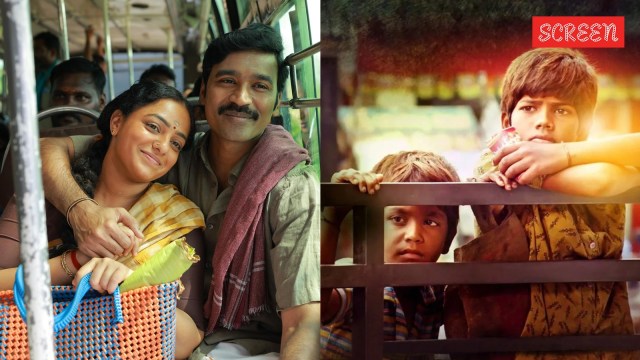Click here to follow Screen Digital on YouTube and stay updated with the latest from the world of cinema.
From Kakka Muttai to Idli Kadai: Food as nostalgia, resistance and love in Tamil cinema
Ahead of the release of Dhanush’s Idli Kadai, let’s look at recent Tamil films that use food as a narrative device to drive home a larger point.
 Ahead of the release of Dhanush’s Idli Kadai, we look back at recent Tamil films that have used food as a metaphor in their storytelling.
Ahead of the release of Dhanush’s Idli Kadai, we look back at recent Tamil films that have used food as a metaphor in their storytelling.“I want to go back to my roots with Idli Kadai,” declared a visibly excited Dhanush at the audio launch of his latest directorial venture. He recalled a childhood memory of gathering flowers from the fields and selling them to buy idlis from the neighborhood eatery. That simple anecdote becomes a poignant metaphor for how we often anchor our emotions to physical, tangible reminders from the past — in this case, an idli. Just as Dhanush distills his childhood into an endearing plate of idlis, filmmakers have long used food as a narrative device, a symbolic shorthand to evoke visceral emotions, underscore conflicts, or lend depth to the larger storyline.
Going by the trailer, Dhanush’s latest outing Idli Kadai follows the emotional journey of a corporate employee drawn back by memories to revive his father’s small-town eatery and reclaim his legacy. The film suggests that the idli kadai itself stands as a symbol of the protagonist’s nostalgic yearning for his parents’ life and the cultural roots he once abandoned in pursuit of a lucrative city career.
Idli Kadai serves as a call to slow down, to look back at what came before us, and to rediscover meaning in important things we have abandoned in the ceaseless race for progress. In this narrative, the humble idli becomes a metaphor for a life once lived.
Ahead of the release of Dhanush’s Idli Kadai, let’s look at recent Tamil films that use food as a narrative device to drive home a larger point.
Kakka Muttai is the first film that comes to one’s mind when talking about food and cinema. This National Award-winning film, directed by Manikandan and backed by Vetrimaraan, is a deliciously written independent film that deals with two kids living with their single mother in a slum. When a newly opened pizza joint in the neighborhood sparks contention among the kids, the strange and alluring food becomes an aspirational treat, a coveted experience amid their otherwise economically challenged lives.
The film uses the grim reality of socially isolated children to explore the psychology of desire, revealing how society curtails even the most basic aspirations and needs through the barriers of class, caste, and economic background.
Another recent film that used food as the foundation for its social commentary was the underrated Annapoorani. The Nayanthara-starrer stood out for portraying food as an obstacle in the journey of an aspiring chef from a conservative Brahmin household, where her dogmatic parents forbid her from even being in the presence of meat. The story of female emancipation unfolds through her fight to claim agency over what she eats and to pursue her passion. The act of eating meat becomes a narrative device that raises pressing questions about the infringement of personal choice.
Also Read | From Ghilli to Balti: The evolution of the sports genre in Tamil cinema
The Great Indian Kitchen is as revolutionary as any film can get on the subject of food, freedom, and the treatment of those relegated to preparing it in our society. The Tamil remake, starring Aishwarya Rajesh and Rahul Ravindran, retains the bite and fervor of the original Malayalam film, dissecting innate patriarchy and regressive social codes through our relationship with food, how we eat it, how we expect it to be served, and how we clean up afterward.
The Great Indian Kitchen employed men’s convenient food habits and their lack of accountability in culinary matters as an allegory for how they treat women at large. More than a food movie, it used cuisine as a springboard to ignite discourse on the gender politics of our times. Films about food that manifest larger social ideas need not always be glossy, feel-good affairs, and this is proof.
Un Samayal Arayil (2014), starring Prakash Raj and Sneha, uses food as a narrative device to bring together two middle-aged loners yearning for companionship in a bustling city. A remake of the Malayalam film Salt and Pepper, this Tamil iteration doubles as a loving homage to Tamil culture and cuisine, framing the act of sharing food as the ultimate expression of love in a relationship. Belonging to the gentler variety of food films, Un Samayal Arayil, true to its source, takes delight in the little joys of cooking, showing how food can forge deep human connections. Its tender story of two socially awkward people finding each other finds its perfect metaphor in a cake affectionately called Joan’s Rainbow, which becomes a vessel of healing, memory, and rediscovery.
Also Read | The weird and out of the box romantic fables of Vignesh Shivan
Ninnila Ninnila (2021), starring Ashok Selvan, Nithya Menen, and Ritu Varma, is perhaps the most underrated film on this list. It uses food as a backdrop for an unconventional love triangle involving a ghost, a chef with a mysterious medical condition, and his skeptical colleague, all of whom embark on a life-affirming journey. For the hero, food becomes a reminder of a lost love; for another character, it fills a void left by the past. In this beautifully photographed film, food emerges as a shared language of healing and sustenance.
- 01
- 02
- 03
- 04
- 05


































